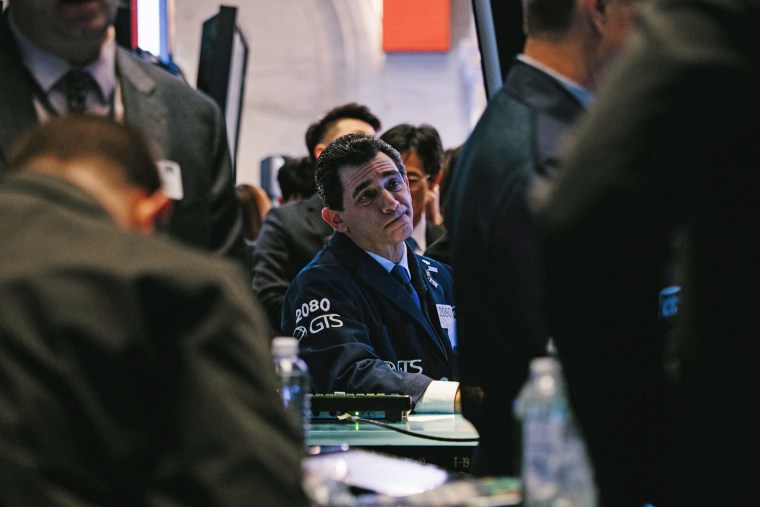With the threat of a trade war hanging over markets as the week drew to a close, analysts blamed a “perfect storm” of events for volatility that saw the stock market swing into near-correction territory on Thursday, pare losses on Friday, then tank at the end of the day to close 400 points down.
“I think there was a pretty big confluence of negative events,” said Dan North, chief economist at Euler Hermes North America.
The prospect of a more hawkish Federal Reserve, continued political disruption and the departure of key White House personnel, and a deficit-growing spending bill all added to the uncertainty injected by Trump administration plans to levy tariffs on $60 billion worth of Chinese imports.
“To me, it’s really all about the Fed and liquidity in the market which caused volatility,” said Joseph Lavorgna, chief economist for the Americas at Natixis.
“What started equity volatility was a larger than expected increase in wages, which made investors worried about inflation and the Fed’s response,” he said.
This week’s affirmation of a less accommodative stance, with interest rates rising and the central bank shrinking its balance sheet, reinforced those jitters, he said, and the escalating trade rhetoric pushed investors over the edge.
“It’s a perfect storm,” North said. “I think what you have now in the market is a realization that we’re at high valuations in an uncertain atmosphere, and it maybe doesn’t take a whole lot to trigger emotional responses.”
Other economists echoed the observation that the tariff announcement, and China’s counterpunch threatening tariffs on $3 billion worth of China-bound U.S. exports, were the tipping point in an already-unstable outlook.
“If it wasn’t the tariffs, it would be something else the market would worry about,” Lavorgna said.
“I think there’s a general sense of rising risk aversion,” said Monica de Bolle, senior fellow at the Peterson Institute for International Economics. “These are unprecedented actions.”
Athough China’s response, which threatens 15 to 25 percent tariffs on goods ranging from steel to pork, was surprisingly muted, de Bolle said they were carefully targeted to exert maximum political pressure.
“The Chinese aren’t worried about targeting a volume of impact — they think their strategy gets a bigger bang if they go after specific products or specific sectors,” she said. A tariff on pork, in particular, would be felt strongly in parts of the red-state heartland, she said, while the potential for supply chain disruptions could be felt throughout the manufacturing sector.
“If we have a trade war, some companies are going to get hit pretty hard,” said Brian Decker, a financial planner and founder of Decker Retirement Planning. There’s an unknown right now how much earnings are going to be affected,” he said.
PIIE’s de Bolle said the unprecedented nature of the White House trade rhetoric makes the Chinese response a wild card.
“They’re really scared of China because that’s an unknown and nobody has a sense of what’s in Chinese policymakers’ heads,” she said. “They can disrupt a lot of things.”
